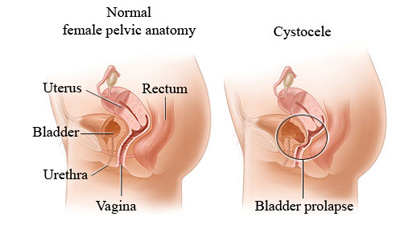Services
- Diagnostic Laparoscopy
- Endoscopic Procedures (Keyhole Surgery)
- Fastest Laparoscopic Procedures
- Hysteroscopic Surgeries
- Laparoscopic Fertility Promoting Surgery
- Laparoscopic Gynaecological Surgery
- Laparoscopic Hysterectomy
- Laparoscopic Operative Procedures
- Laparoscopic Reproductive Surgery
Pelvic Organ Prolapse:
Pelvic organ prolapse occurs when a pelvic organ such as your bladder drops (prolapses) from its normal place in your lower belly and pushes against the walls of your vagina. This can happen when the muscles that hold your pelvic organs in place get weak or stretched from childbirth or surgery.
Many women will have some kind of pelvic organ prolapse. It can be uncomfortable or painful. But it isn’t usually a big health problem. It doesn’t always get worse. And in some women, it can get better with time.
More than one pelvic organ can prolapse at the same time. Organs that can be involved when you have pelvic prolapse include the:
- Bladder. This is the most common kind of pelvic organ prolapse.
- Urethra
- Uterus
- Vagina
- Small bowel
- Rectum

Pelvic organ prolapse is most often linked to strain during childbirth. Normally your pelvic organs are kept in place by the muscles and tissues in your lower belly. During childbirth these muscles can get weak or stretched. If they don’t recover, they can’t support your pelvic organs.
You may also get pelvic organ prolapse if you have surgery to remove your uterus (hysterectomy). Removing the uterus can sometimes leave other organs in the pelvis with less support.
Pelvic organ prolapse can be made worse by anything that puts pressure on your belly, such as:
- Being very overweight (obesity).
- A long-lasting cough.
- Frequent constipation.
- Pelvic organ tumors.
Older women are more likely to have pelvic organ prolapse. It also tends to run in families.
Symptoms of pelvic organ prolapse include:
- Feeling pressure from pelvic organs pressing against the vaginal wall. This is the most common symptom.
- Feeling very full in your lower belly.
- Feeling as if something is falling out of your vagina.
- Feeling a pull or stretch in your groin area or pain in your lower back.
- Releasing urine without meaning to (incontinence), or needing to urinate a lot.
- Having pain in your vagina during sex.
- Having problems with your bowels, such as constipation.
Your doctor will ask questions about your symptoms and about any pregnancies or health problems. Your doctor will also do a physical exam, which will include a pelvic exam.
Decisions about your treatment will be based on which pelvic organs have prolapsed and how bad your symptoms are.
If your symptoms are mild, you may be able to do things at home to help yourself feel better. You can relieve many of your symptoms by adopting new, healthy habits. Try special exercises (called Kegels) that make your pelvic muscles stronger. Reach and stay at a healthy weight. Avoid lifting heavy things that put stress on your pelvic muscles.
What We Treat :
Female Urinary Problems | Recurrent Miscarriage | Menopausal Problems | Gynaecological Malignancies | Menstrual Irregularities | Puberty Related Disorders | Endometriosis | High Risk Pregnancy | Infertility | Ovarian Cysts & Tumours | Pelvic Organ Prolapse | Urinary Incontinence | Uterine Fibroids



